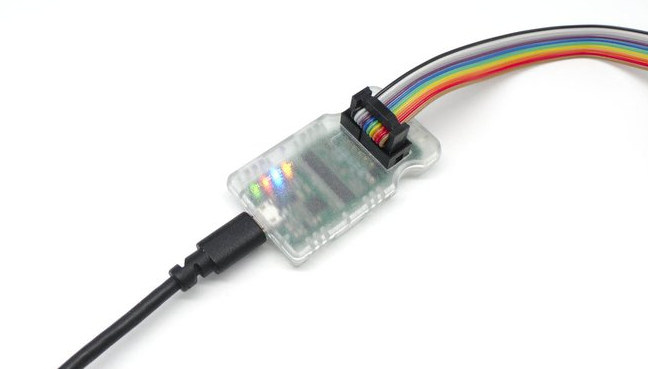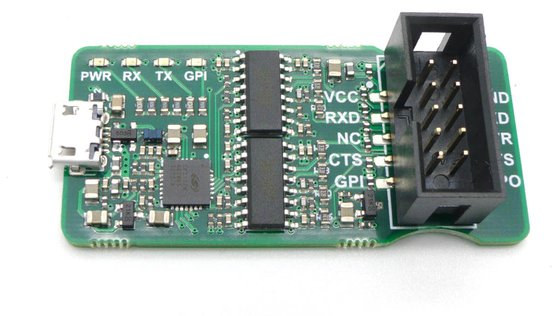I’ve never had specific issues with USB to TTL debug boards personally, but potentially you could damage the target if you select one with the wrong voltage, and for more advanced use cases often do not include GPIOs.
μArt USB to UART-TTL Adapter aims to solve those issue with wide voltage range (1.8 to 5.4V), safety features like galvanic isolation or over-current protection, and one header exposing I/Os.
- Universal TTL-UART – 1.8 – 5.4 V, up to 3M speed, standard & non-standard baudrates, pins for handshaking and flashing various MCU families, wide OS-support
- Galvanic isolation, integrated pull-ups, signal- and power-filters
- Over-current protection, reverse-polarity protection, ESD protection, mechanical protection
- Voltage-autosensing, LEDs, GPIOs, software-configurable
- Dimensions – 58 x 33 x 14 mm
- Weight – 16 grams
Everything is also packaged in a case contrary to most (all) other boards in the market.
The developer provides drivers for Windows, Linux, MacOS, etc…, although currently GPIO support only works with Linux and Windows.
The μArt adapter is now crowdfunding on Crowd Supply, and the project has already raised close to $12,000 with 36 days to go. You’ll need to pledge at least $32 to get a “simple μArt” with plastic enclosure, but kits with cables are also available, as well as bundle of multiple boards. Shipping is free worldwide unless you need registered mail which adds $4 to $7, and you should expect your rewards to be shipped around mid November 2018.

Jean-Luc started CNX Software in 2010 as a part-time endeavor, before quitting his job as a software engineering manager, and starting to write daily news, and reviews full time later in 2011.
Support CNX Software! Donate via cryptocurrencies, become a Patron on Patreon, or purchase goods on Amazon or Aliexpress







Seems there are no technical details anywhere?
Hi, technical documentation (schematics and datasheet) have been available for weeks on various forums and hackaday.io, but I generally do not link to them unless explicitly asked because they are not final yet. For one example, I am in active communication with SiLabs and holding my breath for a positive resolution of a problem, if not then the schematics will need to change.
Anyway, I just uploaded the preliminary datasheet and schematics to the project’s own website: uart-adapter.com
Let me know if there is anything else I can help with.
The creator
A bit expensive. I use TXS0108E module for voltage level matching and for galvanic isolation I’d rather just buy another AC/DC SMPS. A good quliaty on can be had for cheaper than this whole thing, and it can be put to multiple uses.
I run a stlink clone with blackmagic probe connected through an TXS0108E
adaptive logic level converter. I get SWD flashing with GDB server running on the stlink and uart passthrough for less then 3$.
usb2ttl for $32? $3.2 is enough… just cp210x + some voltage convert chip.
Isolators are a bit more expensive than that. Isolators that work in the multi-megahertz range and support SPI mode even more so. See the Si8423 for example.
Still, $32 doesn’t exactly favor buy over build.
Hi, creator of the project here.
You are comparing the cost of a finished product to the cost of its components, which is very biased. Also, building anything yourself will always be cheaper than buying, be it electronics, jewelry, or your house – assuming you get it right the first time, your time costs no money, and you actually have the time do it on your own. FYI, the BOM + manufacturing of the muArt is already about 2/3 of the $32, and the rest are the shipping fee, payment processing fees, crowdfunding fee and other collateral material, all of which are already included in the $32 you pay. My buffer is very low. Unsurprisingly, once the crowdfunding period is past, the thing will cost more in retail.
At least he deserves a medal to have added GPIO support to Linux mainline kernel for this CP2102N:
https://www.crowdsupply.com/pylo/muart/updates/mart-and-its-linux-contributions
Now I am curious if this new driver will also work for CP2104 breakout boards which have 4 GPIOs exposed.
Hi, creator of the project here.
I had no CP2104 to test so out of the box and ATM the GPIO driver only supports CP2102N. But theoretically the CP2104 uses similar (the same?) USB requests, so adding support for it should be trivial for anyone who can test it.
Will try it, I have one laying around here.